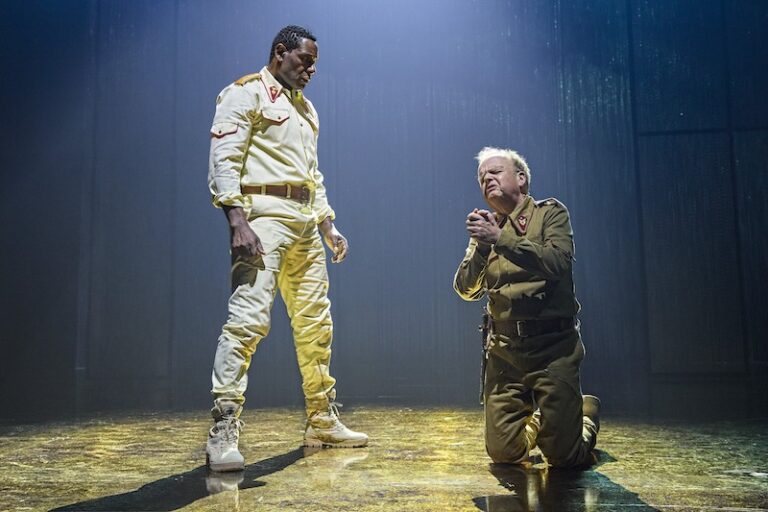Writer: William Shakespeare
Director: Tom Morris
One comes to Othello with a certain degree of expectation. There will be a reckoning of the play’s depiction of race and racism, to be sure. There will also need to be a convincing mechanism by which the stoic, heroic Othello, who starts the play being completely smitten with his new wife Desdemona, is able to flip into a jealous, vengeful husband driven mad by the idea that she has been unfaithful.
What is less common is to find rich seams of sly humour, and that is almost entirely due to Toby Jones’s portrayal of Iago. When we first encounter him, dressed in the khakis of an NCO rather than the crisp dress uniforms of the officers his senior, Iago is scheming, yes, but his anger is unfocused. This is a man who feels slighted by life, denied the Venetian trappings he feels he deserves. There’s more than a whiff of the incel about this man.
In Iago’s world, David Harewood’s Othello is a symbol of everything the smaller man wants for himself. The accomplished soldier and leader has earned recognition and status, and snagged himself a wife (Caitlin Fitzgerald) from one of the city-state’s finest families. That marriage does provoke the ire of Desdemona’s father, Brabantio – an underutilised Peter Guinness matching FitzGerald’s Irish-American accent perfectly – but beyond that, Othello seems to have it all, and thus becomes the focus of Iago’s rage and bitterness.
Jones delivers his lines much more as prose than poetry, further emphasising the perception of class difference. As he begins his whisperings, inspiring Tom Byrne’s Roderigo to reveal Othello’s marriage to the soldier’s new father-in-law, we witness the first pricklings of the play’s race-inflected hate. Morris and Jones give us an interpretation of Iago who may not be a racist himself, but is quite prepared to use Othello’s difference as a wedge. His needling echoes his target’s own awareness of his unique status.
In contrast, Harewood stands tall and strong amongst his fellow Venetians, whether in the Duke’s court, commanding his troops (including Luke Treadaway’s Cassio, who feels rather shorn of personality in this interpretation) and, most especially, with FitzGerald as his wife. Hers is a Desdemona who wears her noble status lightly, but also deploys it with such ease that one can see how Othello’s outward confidence could be hiding the insecurity that Iago is able to tap into.
It is a perennial problem with Othello that the titular character can flip so severely in so short a time. Both Harewood and Jones work hard to make the timeline believable, and while their attempts do not entirely succeed, they still carry much weight. In the play’s final acts, as his character becomes more deranged, Harewood delivers a man who has spent his whole life holding in rage, and is undone by its release.
Throughout all this, Jones retains an impish quality even during his darkest machinations, spitting venom in his soliloquies aimed at everyone, especially women. As is so often the way, he actually has a lot of what he claims to desire: his wife Emilia (Vinette Robinson) loves him so much that she procures Desdemona’s dropped handkerchief without ever asking why Iago was so keen for her to steal it. Robinson is quietly superb here, always attempting to be the best maid to her mistress, the best wife to her husband, and the best conscience for both. Her devastation when she realises her small act of theft has been the pivotal, necessary element of Iago’s plan to see Desdemona murdered by her husband’s hand speaks volumes.
Not everything in this production works as well. Treadaway’s Cassio rarely feels as fleshed out as the other principals, and some of the flashier elements of Ti Green’s set design feel superfluous. But it is refreshing to see a West End Shakespeare production that is not afraid to stick with a relatively conventional approach, allowing contemporary hues to emerge organically rather than feel tacked on and over-emphasised. This Othello has the original writer’s voice, but with a timbre all its own.
Runs until 17 January 2026

